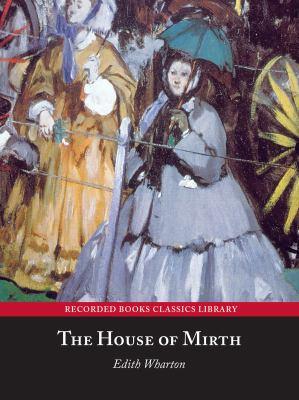
House of Mirth
What Galsworthy did for Edwardian England, Wharton did for turn-of-the-century New York, and she did it to perfection in The House of Mirth. Hackles bristle discreetly, lips curl ever-so politely, and every breach of good taste is carefully recorded, as social aspirant Lily Bart launches a desperate bid for a place on the city's elite social register
Other Formats
Browse Related Items
| Subject |
| Psychological fiction. Single women > Fiction. Social classes > Fiction. New York (N.Y.) > Fiction. |
| Genre |
| Electronic books. |
- ISBN: 9781470398798 (electronic bk.)
- Physical Description 1 online resource : multiple file formats.
- Publisher Salt Lake City : Project Gutenberg Literary Archive Foundation, 1995.
Content descriptions
| General Note: | Recorded Books classics library. Records generated from Project Gutenberg RDF data. |
| Additional Physical Form available Note: | Downloadable applications available for access via iOS 4.0+ devices (iPhone, iPad, iPod Touch) and Android 2.1+ devices. |
| Terms Governing Use and Reproduction Note: | Applicable license: http://www.gutenberg.org/license |
| Source of Description Note: | Title from resource description page (Recorded Books, viewed August 16, 2013). |
Additional Information

The House of Mirth
Click an element below to view details:
Excerpt
The House of Mirth
From Jeffrey Meyers's Introduction to The House of Mirth by Edith Wharton The House of Mirth , conventional in form but still very readable and perceptive about the social roles of modern women, appeared almost a century ago, in 1905. That year, Japan's defeat of Russia led to the first Russian Revolution, the formation of workers' Soviets, and the mutiny on the battleship Potemkin . In 1905 Einstein proposed his First Theory of Relativity and Freud published his Three Contributions to the Theory of Sex . There were also new currents of modernism in art, music, and literature. John Singer Sargent painted The Marlborough Family , Henri Rousseau The Hungry Lion , and Henri Matisse La Joie de vivre . Franz Léhar composed The Merry Widow , Claude Debussy La Mer , and Richard Strauss Salome . G. B. Shaw brought out Major Barbara , H. G. Wells Kipps , and E. M. Forster Where Angels Fear to Tread . There was considerable unrest in the United States as well as in Russia, and as the historian John Higham noted, "It was a time of mass strikes, widening social chasms, unstable prices, and a degree of economic hardship unfamiliar in earlier American history. Edith Wharton was intimately acquainted with the ruling class, with people who had money and property, wealth and power. As Louis Auchincloss observed: "She knew their history and their origins, their prejudices and ideals, the source of their money and how they spent their summers." She seemed to hate the society she belonged to, and described it with pervasive irony and sharp wit. Her philistine and hypocritical characters are spoiled and selfish, idle and self-indulgent, hedonistic and materialistic; their social hierarchy, through which Lily Bart makes her tragic descent, is as rigid as the Army or the Church. In a society rife with financial scandal and sexual intrigue, anything is allowed as long as the transgressors are wealthy and maintain a respectable façade. The "vulture" Carry Fisher, who's twice been divorced and receives money from Gus Trenor, has powerful protectors and is invited everywhere. The fierce and vindictive Bertha Dorset has flagrantly indiscreet affairs with Selden and Silverton but, ironically protected by her victim Lily Bart, manages to maintain both her reputation and her marriage. In her revealing introduction to the 1936 reprint of The House of Mirth , Wharton explained her choice of subject and suggested her major theme: "When I wrote The House of Mirth I held, without knowing it, two trumps in my hand. One was the fact that New York society in the nineties was a field as yet unexploited by an novelist who had grown up in that little hot-house of traditions and conventions; and the other, that as yet these traditions and conventions were unassailed, and tacitly regarded as unassailable." She admitted that she "wrote about totally insignificant people, and 'dated' them by an elaborate stage-setting of manners, furniture and costume." Such people, she said, "always rest on an underpinning of wasted human possibilities," and their sadly vulnerable victim was "the tame and blameless Lily Bart." Ironically listing Lily's misdemeanors, Wharton described her as "a young girl of their world who rouged, smoked, ran into debt, borrowed money, gambled and--crowning horror!--went home with a bachelor friend to take tea in his flat!" Wharton's caustic novel, piercing the secure stockade of convention, alarmed and disturbed the rulers of New York. In a letter of November 11, 1905, a month after the book appeared, Wharton defended her work. She said that the American upper classes lacked the sense of social responsibility, the noblesse oblige still maintained by their aristocratic counterparts in Europe: "I must protest, & emphatically, against the suggestion that I have 'stripped' New York society. New York society is still amply clad, & the little corner of its garment that I lifted was meant to show only that little atrophied organ--the group of idle & dull people . . . [whose] sudden possession of money has come without inherited obligations, or any traditional sense of solidarity between the classes." Excerpted from The House of Mirth by Edith Wharton All rights reserved by the original copyright owners. Excerpts are provided for display purposes only and may not be reproduced, reprinted or distributed without the written permission of the publisher.


